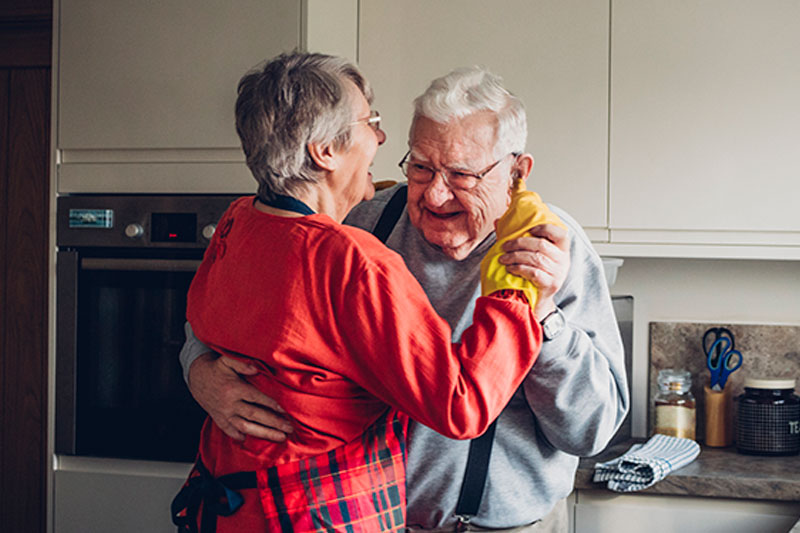
Learn about the many benefits of exercising with dementia.
When a loved one has dementia and all of the challenges that it involves, family care providers need a toolbox chock-full of helpful strategies. Out of all the innovative approaches care providers can use to help make life as meaningful, safe, and comfortable as possible, there’s one remarkably effective strategy that may be neglected: exercise.
We know that fitness is necessary for all of us, both physically and mentally, and that doesn’t change with a dementia diagnosis. Working out can help:
- Improve sleep
- Improve flexibility, balance, circulation and muscle strength:
- Reduce pain
- Lower the possibility of falls
- Improve state of mind and attitude
- And much more
On top of that, it’s drug-free, so there are no unwanted side effects to worry about:
To encourage and motivate a loved one to make exercising with dementia a part of a regular routine, plan to work out together. This way you can easily model the movements and assist the individual when necessary – keeping in mind that doing the exercises as independently as possible is a great way to build self-esteem and confidence.
Unsure where to begin? Try these exercises, in accordance with the senior’s ability level.
Exercises for Early and Mid-Stage Dementia
These more advanced exercises work well for a person with less cognitive impairment:
- Register (together!) for an exercise class at the local senior center, YMCA, or gym. If the older adult prefers being in the pool or may benefit from a lower impact workout, try water exercise.
- Dance! You can dance together in the privacy of home, sign up for a dance class, or bring the older adult to social events at your local senior center that include dancing. Bonus: music is remarkably helpful in stirring memory for older adults with dementia.
- Work together in the garden – raking, digging, planting, pulling weeds, picking vegetables and flowers. Getting outside in the fresh air is an excellent mood booster as well, and the work provides a satisfying sense of purpose.
- Get cleaning! Household chores like sweeping, dusting, vacuuming, and even folding laundry are great ways to work out, and accomplishing these tasks together allows for conversations, reminiscing, and a sense of fulfillment when the work is done.
- Take a walk together – around the block, at the local park, in a shopping mall. Stick to the same route if the senior prefers, or change it up from day to day if more variety is appreciated.
Exercises for Later Stage Dementia
Alterations will need to be made as the disease advances, but there are still plenty of opportunities to incorporate physical exercise into the senior’s day, such as:
- Sit to stand: From a seated position, with as much help as needed, the senior will rise up to a standing position, pause for a few seconds, and go back to a seated position. Repeat several times.
- Chair stretches: This video provides a number of different stretches that will help strengthen and build muscles throughout the body.
- Bed stretches: For a loved one who is bed-bound, moving and bending the arms and legs, whether independently or with assistance, can help relieve stiff muscles.
Get in touch with Live Free Home Health Care’s home care specialists in Concord, NH and surrounding areas for assistance with implementing the ideal (doctor-approved) fitness regimen for someone with dementia, along with the compassionate companionship that makes exercise more enjoyable! Reach us any time at 603-217-0149.
